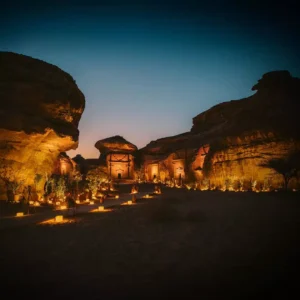Ramadan, the holy month in the Islamic world dedicated to fasting, prayer, and reflection, is predicted to take place this year on or around April 12 to May 12. The dates change annually as they are determined by the sighting of a new moon, and for many Muslims the start and end of Ramadan will be declared the day before.

Traditional Ramadan silverware and cutlery
During Ramadan, Muslims fast from sunrise to sunset. After sunset, and during iftar (the meal to break the fast) people will typically enjoy dates, meat or cheese sambousas, and Ramadan juices, before heading to evening prayer. After that, large meals are served, usually with family and friends, and Ramadan specific desserts, such as cream or nut-filled qatayef are shared. Suhoor is a meal taken just before sunrise, before the day’s fast begins.
For travelers to Saudi Arabia, it is important to remember that during Ramadan, drinking and eating in public during the day can be considered offensive. Individuals who want to eat or drink during daylight should do so in the privacy of their own homes or in designated screened-off areas within public places. Restaurants will also be closed from dawn to dusk; however, take-out may be available during the day.

Cheese-filled sambousas – stuffed pastry – very popular appetizer in many Arab countries, especially during Ramadan
Many businesses in Saudi Arabia will shift their employees’ hours to accommodate fasting. The Ministry of Resources and Social Development in Saudi Arabia announced that official working hours in the month of Ramadan for government employees is from 10 AM to 3 PM, while the banking sector is open from 10 AM to 4 PM. As for the private sector, timing varies from company to company.
Due to the pandemic, the Saudi government announced some restrictions on traditional Ramadan customs. Traditional iftar and suhoor buffets in restaurants and hotels, as well as public iftar in mosques, are prohibited by the government as a precautionary measure to combat the spread of COVID-19 during Ramadan and Eid Al-Fitr. Instead, the government is encouraging drive-through systems at restaurants for takeaway orders and encouraging smaller, private gatherings.
Despite the restrictions on suhoor and iftar meals this year, there are other ways visitors and non-Muslims can get involved. This includes exchanging Ramadan greetings such as “Ramadan Kareem,” which translates to “Wish you a generous Ramadan;” donating care packages to those less fortunate; and fasting along with your Muslim colleagues for a day or two and breaking the fast together at the time of iftar.

Ramadan Jalabiya and accessories from Homegrown Makret, based in Jeddah, Saudi Arabia.
You can also enjoy going to the mall at any given time, as shopping malls will be open 24/7 to accommodate COVID-19 occupancy limits and give Saudis more flexibility to shop at night after the fasting period is over. Online shopping is also very popular during Ramadan. Something to consider buying is the traditional Jalabiya, worn by women on celebratory occasions. Wearing a Jalabiya has recently become associated with Ramadan and is a staple in every Saudi woman’s wardrobe. You can purchase one at bazaars and stalls in shopping malls or on various Saudi online shopping websites. Do not hesitate to purchase and use a miswak, a teeth cleaning twig made from the Salvadora persica tree. It is very common for locals to use the miswak several times a day to ensure mouth freshness.



